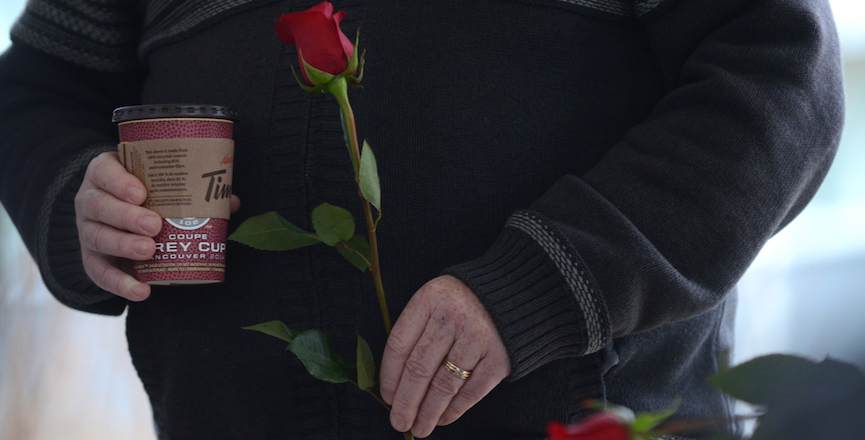On December 6, 1989 a lone gunman entered a classroom of 60 engineering students at École Polytechnique. He ordered the men to leave the room. The murderer was than heard to scream, “I hate feminists,” before opening fire and killing 14 innocent women: Anne St-Arneault (23), Geneviève Bergeron (21), Hélène Colgan (23), Nathalie Croteau (23), Barbara Daigneault (22), Anne-Marie Edward (21), Maud Haviernick (29), Barbara Klueznick (31), Maryse Laganière (25), Maryse Leclair (23), Anne-Marie Lemay (22), Sonia Pelletier (23), Michèle Richard (21), and Annie Turcotte (21), simply because they were female.
This December 6 marks the 28th anniversary of the mass femicide at École Polytechnique. Vigils will be held across Canada to commemorate the horrendous act that made it far too clear to all women that if you are female there are no safe spaces.
In Canada it’s well documented that:
- One in three women will experience some form of sexual violence in their lifetime.
- Half of all women in Canada have experienced at least one incident of physical or sexual violence since the age of 16.
- 70 per cent of spousal violence is not reported to the police.
- A woman is assaulted an average of 35 times before she calls the police the first time.
- It takes seven attempts before a woman leaves an abusive relationship for good.
- A woman’s chances of being murdered increase nine-fold once she leaves her partner.
- Every six days, a woman in Canada is killed by her current or former intimate partner.
- First Nations, Inuit and Métis women are killed at rates six to seven times greater than those of non-Aboriginal women and are almost three times more likely to be killed by a stranger than non-Aboriginal women.
All of these numbers increase significantly for women experiencing multiple oppressions including identifying as a person of colour, an immigrant, Indigenous, or having disabilities.
Life circumstances that make it impossible for women to leave include not being able to find room at a local women’s shelter, not having a job or reliable income, lack of affordable housing and child care, and death threats that may extend to children and pets.
In recent weeks, women of every age and background have been speaking up about the abuses they endure at work in order to keep their jobs or advance their careers. While these revelations may be shocking to some men, it’s the legacy women have had to endure since time immemorial.
Canadians need to face up to the fact that gendered violence and femicides have reached epidemic proportions.
December 6 is the National Day of Remembrance and Action on Violence Against Women in Canada. As Canadians, we do a remarkable job when it comes to mourning and remembrance, but we are not as forthcoming with action.
This should be the day that Canadians remind politicians at every level of government that in order to eradicate gendered violence we need true equality for all women and girls. Until that day is realized, Canadians need to make sure supports are in place to help women and children living with, leaving, and healing from gendered violence and femicide.
To that end, I’m asking each and every person who reads this article to contact their local Women’s Centre and volunteer your services if you are a family lawyer, accountant, job coach, counsellor or mediator.
Don’t have a skill or the time to volunteer? Then, pull out your cheque book and make a financial gift in the name of your mother, sister, cousin, aunt, grandmother, step-mother, wife, co-worker, daughter, niece, or female teacher.
Heck, why not have your entire hockey team, school, office, choir, or church group take up a collection to donate to this worthy cause.
Women’s Centres rely almost exclusively on community donations to keep their doors open and to provide much needed support for women in crisis. It may be as simple as having a cup of tea once a week with like-minded women who have gone through similar trauma. But, without the funds to keep Women’s Centres’ doors open and without experienced staff to refer women to services that will help them move on to a safer place, women and their children will fall through the cracks.
For those of you living in Halton Region, The Women’s Centre of Halton does fantastic work, and Martha Barragan, Executive Director, works tirelessly to ensure women have a safe place to gather and access to essential services that they need.
In Hamilton, let’s give a shout out to The Native Women’s Centre and its Executive Director Cindilee Ecker-Flagg. This Centre accomplishes miracles with virtually no money including running Honouring the Circle, a transitional housing and support program that is essential in these times of rising housing costs.
This National Day of Remembrance and Action on Violence Against Women in Canada be that person who makes a real difference and give generously to your local Women’s Centre. You may just save a life.
Image: University of the Fraser Valley/flickr
Like this article? Please chip in to keep stories like these coming.




